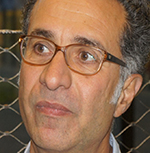Reading in the Dregs of Forced Displacement
I. She reads the past in coffee dregs
“We descended from the mountainous clouds.
On bent backs we hauled barrels of olive oil,
handfuls of sacred soil and burlap bags
of lost and displaced farming memories.
We wandered in a withered procession,
between pale surnames of rephrased cities,
hauling our own bulbs like orphaned lilies
on the humps of ancient curvy letters,
laden with red exclamation marks
and diacritics of anxiety.
We were bullied, shackled, stacked on lorries,
transferred, expelled to a bitter exile.
Bitter! Add some sugar to my coffee.
Stayed the predestined nights. Not one more night.
Named “refugees, bugs, beggars, petty thieves.”
We returned when the moon refused to shine,
that moonless night, on our knees, arched backs
bending forward like heavy ears of wheat,
two months after that summer’s lost harvest.
We went back in the dark, dodging bullets,
travelled between written lines and took sharp
turns at proper nouns of cities and towns,
arrived at streets we could recite by heart,
we could not enter, nor could we depart.
The lore of our ancestors. My sorrow!
Some lines erased, bent over other lines
others rephrased with foreign characters
cast like concrete angular cubicles.
In time, we backtracked to one proper line
and got stuck on its deserted margin
like fortuitous ink stains, present there,
we were, but deemed absent in the feigned
demography of foreign characters.”
II. On the mountain of sorrow, the fortune-teller went silent. But her misfortune emerged after a while in the dregs of another coffee cup
“Fifteen barrels of olive oil
five or six burlap bags of wheat
three jars of bee-honey so sweet
and I had just baked flat bread
not one hour before we fled
all left behind… oh my sorrow
three cows, two horses, the chicken
a hundred and twenty acres
and many other farming nouns
all left behind … oh, my sorrow
became outcasts in our own land.
Without nouns, the verbs of farming
become stop words at coffee time.
Enough futile stop words for now.”
III. And she coiled up in her seventy-five-year-old inner cubicle, refusing to read any past in any type of dregs
That, what she would never read,
forever rings in my inner ear.
IV. The dregs of forced exile
I’ll always remember her solemn voice
in the ancient tales about ghouls and jinns
about villagers hypnotised by wolves
and hyenas, and taken for pale prey.
Indeed, she believed all the fairy tales
but she utterly refused to believe
the fabled fiction tales of presence-absence.
My grandma denied all forms of Exile
their adjectives of ecstasy; the cold
foreign cubicles, their secure pleasures
of triumph; emasculated the pages
of absence, their margins and the bloody
surreality of presence-absence.
She died wearing with pride all synonyms
of sorrow and a blue tattoo of a cross
on her bare forehead. And we inherited
the empty space she had to leave behind.
Here, where the lilies grow in plastic pots
but die of old age, I write my chapter
of forced exile, with angular letters
building concrete cubicles. My sorrow
for the lost words. The lost diacritics.
the lost curves. My sorrow. Oh my sorrow.

Khalil Sima’an is a Palestinian poet living in Amsterdam, The Netherlands. His poetry appeared in Fikra Magazine, The Palestine Chronicle, and will appear in a forthcoming collection of poems. Prior to immigrating to Amsterdam in 1989, he published poems in Arabic language magazines Al-Jadeed and Al-Ittihad. Khalil works as professor of Computational Linguistics at the University of Amsterdam.

 BACK TO ISSUE
BACK TO ISSUE